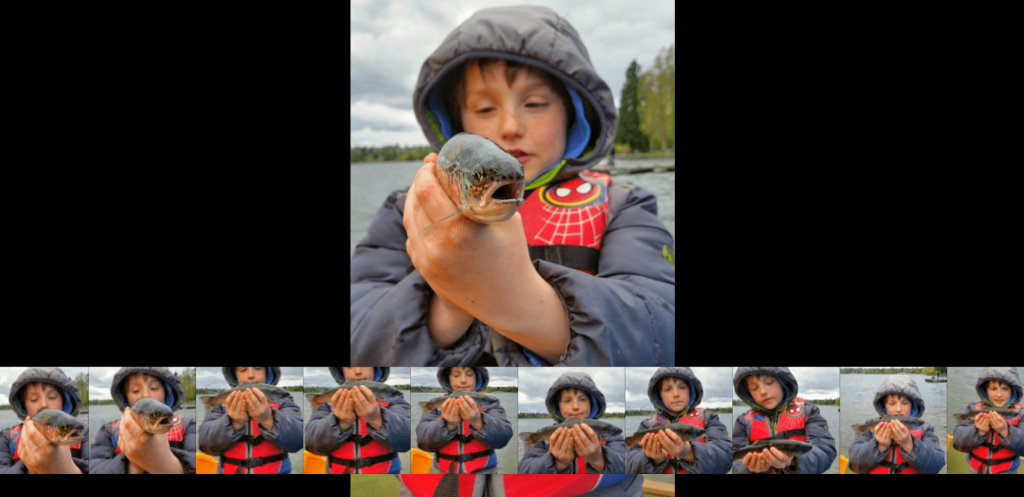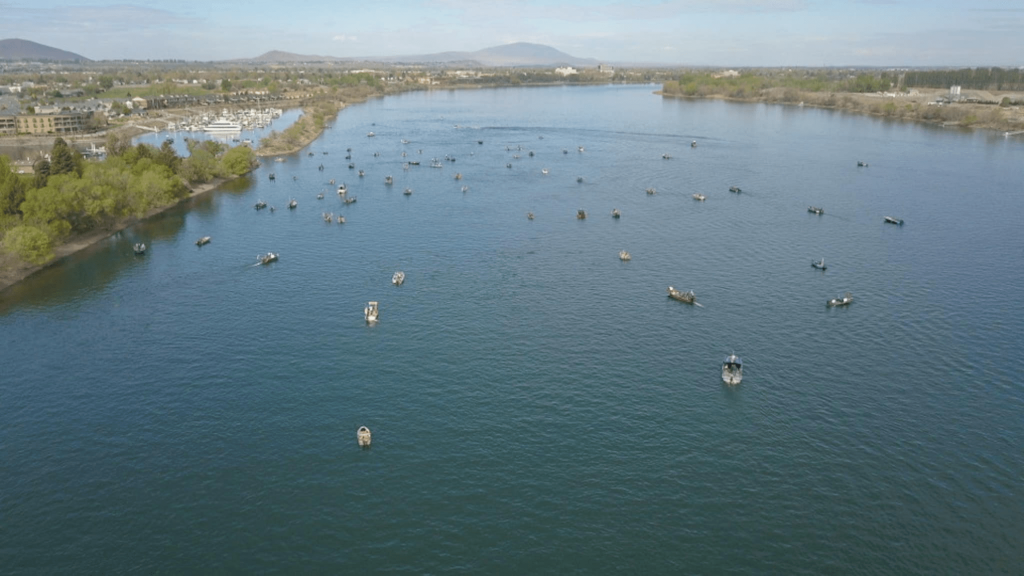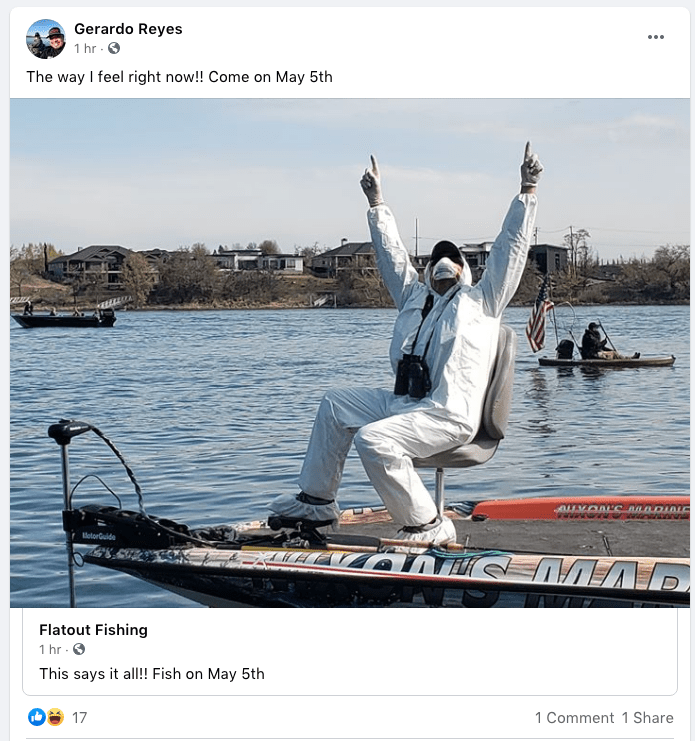
Most Washington Fishing, Hunting To Reopen May 5
Most fishing and hunting will reopen May 5, Washington officials announced this afternoon as they reopened state lands and seasons that have been closed since late March due to the governor’s Covid-19 stay-home order.

The one major initial exception is angling in the ocean, WDFW’s Marine Areas 1-4, plus razor clamming on the coast.
“They will lag behind the May 5 opener for the rest,” said Director Kelly Susewind during a press conference led by Gov. Jay Inslee.
In response to a public radio reporter’s question on Pacific fisheries, Susewind pointed to a lack of available boat ramps on the coast – the city of Ilwaco along with the Makah and Quileute Tribes have closed their launches and/or reservations.
We’ve launched a petition to encourage the governor to work with local communities to reopen coastal fisheries.
It was on the coast that the closures began in mid-March when Pacific County health authorities moved to bar a planned razor clam dig as coronavirus fears ramped up. The initial two-week pause was extended to May 4. No other states went as far as Washington.
It all led to growing frustration among sportsmen and the past two weekends have seen anglers protesting on the Columbia River, Moses Lake and Lake Washington.

Puget Sound halibut and shrimp seasons are also delayed, and nonresident licenses are not being sold at this time.
More details on what is opening can be seen in the below WDFW press releases and FAQ.
Both Inslee and Susewind as well as other natural resource agency heads stressed the need to follow social distancing guidelines.
Susewind said that fishing and hunting should only be done with members of your own household, with all your supplies in hand, and be done locally.
“Basically stick with day trips,” he said.
He also said that if you find crowded conditions at your destination, go elsewhere.
For spring turkey hunters who can’t enjoy their seasons under the above parameters, Susewind said that fees could be refunded.
Camping on state lands — both in campgrounds and dispersed sites — is still closed. Federal lands have also closed campgrounds and trailheads.

Inslee termed his decision to reopen “widespread recreation” a “data-driven” one.
“This is not a return to normal today. The virus is too rampant,” he said, so today’s action represents a phased approach.
He said the state’s action did not bar local jurisdictions from maintaining their own closures.
And he termed the recreational reinstatement as among the first steps of many toward carefully reopening the state.
Inslee signed off the press conference with his trademark “Wash your hands.”
THE FOLLOWING IS A WDFW PRESS RELEASE
WDFW News Release: WDFW to open some recreational fishing and hunting starting Tuesday, May 5
The Washington Department of Fish and Wildlife (WDFW) announced today it will reopen some recreational fishing and hunting in a phased approach following the state’s efforts to limit the spread of coronavirus. The department is asking hunters and anglers to enjoy these outdoor activities only if they can do so locally, while also practicing physical distancing.
Many WDFW wildlife areas and boat ramps will reopen May 5 for day-use only recreation, as will some recreational fishing per 2019-2020 sport fishing rules.
All freshwater fisheries will open May 5, as will Puget Sound saltwater fisheries (Marine Areas 5-13), except for halibut, shrimp, and intertidal shellfish harvesting, which remain closed statewide.
Coastal saltwater fishing and shellfish harvesting in marine areas 1-4, including coastal clam digs, will also remain closed in consultation with local health departments, who continue to be concerned regarding the potential health impact to their communities from outside visitors.
Local hunting for turkey and spring bear will open on May 5, and the spring bear season will be extended until June 30.
“We’ve had so many people doing their part to stay home, and we’re seeing results. We’re now at a point where we will soon be able to begin welcoming people back outdoors,” said Kelly Susewind, WDFW director.
“I’m asking people to take what they’ve learned these past few weeks and continue putting these measures into play as you fish, hunt, and enjoy your local wildlife area. We’re happy to reopen these opportunities, and we need you to continue working with us to stay safe.”
Visitors, anglers, and hunters should only venture out well-prepared. The public should expect limited access to restrooms as staff begin the process to reopen facilties at wildlife areas and water access sites. WDFW is also recommending that people bring their own handwashing materials, toilet paper, and masks or bandanas, and be prepared to change plans if sites appear congested.
WDFW hatchery staff have continued to stock lakes throughout the closure. Anglers are asked to practice appropriate physical distancing at a given location, and avoid crowding on banks, piers, or at boat ramps. The department will be unable to host any formal opening day events for lowland lakes this year.
Anglers should consult the Washington Sport Fishing Rules pamphlet at wdfw.wa.gov/fishing/regulations/ or Fish Washington mobile app, as well as the emergency rule changes webpage at fortress.wa.gov/dfw/erules/efishrules/, before heading out.
If sites become overcrowded or other COVID-19 related public safety concerns develop, the department may reclose areas to further protect public health and safe resource management.
The department is encouraging local county health departments to stay in contact with WDFW regional management regarding any concerns, and notes that the department may also act to close areas during localized future outbreaks to discourage travel or congestion-related spread of the virus.
Spring bear hunters who would normally travel outside their local areas to hunt may wait to see how travel guidance evolves, or seek a permit refund and reclaim their points if they are unable to hunt while meeting local hunting recommendations.
Permit hunters are responsible for securing access, which may not be available for all or for the added season dates. Permit holders will be sent more detailed information that will also be posted on WDFW’s COVID-19 page, and they should contact the Wildlife Program Customer Service Desk at 360-902-2515 or wildthing@dfw.wa.gov if they have additional questions.
WDFW regional offices, visitor centers, and hatcheries will remain closed to the public for now, but remain available by phone.
Those who encounter WDFW staff while in the field should feel free to engage with WDFW employees, but remember to practice physical distancing and keep at least six feet away.
To help discourage travel, the department is suspending the sale of non-resident fishing licenses.
Guidelines for #ResponsibleRecreation in the outdoors Before you go · Check what’s open.
While many state-managed land destinations are open for day-use, other local, tribal, and federal land may still be closed.
· Opt for day trips close to home. Overnight stays are not permitted.
· Stay with immediate household members only. Recreation with those outside of your household creates new avenues for virus transmission.
· Come prepared. Visitors may find reduced or limited restroom services as staff begin the process to reopen facilities at wildlife areas and water access sites. You are advised to bring your own soap, water, hand sanitizer, and toilet paper, as well as a mask or bandana to cover your nose and mouth.
· Enjoy the outdoors when healthy. If you have symptoms of fever, coughing, or shortness of breath, save your outdoor adventure for another day. When you get there
· Avoid crowds. Be prepared to go somewhere else or come back another time if your destination looks crowded.
· Practice physical distancing. Keep six feet between you and those outside your immediate household. Launch one boat at a time to give others enough space to launch safely. Leave at least one parking space between your vehicle and the vehicle next to you. Trailer your boat in the same way.
· Wash your hands often. Keep up on personal hygiene and bring your own water, soap, and hand sanitizer with you.
· Pack out what you pack in. Take any garbage with you, including disposable gloves and masks. For the latest updates on WDFW’s coronavirus response and to check the status of your favorite destinations, visit wdfw.wa.gov/about/covid-19-updates. Find more guidelines for responsible recreation in this WDFW blog.
THE FOLLOWING IS A JOINT WDFW-STATE PARKS PRESS RELEASE
State recreation lands to reopen May 5 for local day-use only
The Washington Department of Fish and Wildlife (WDFW) and Washington State Parks and Recreation Commission (Parks) announced today they will reopen state-managed lands on Tuesday, May 5, for local day-use only recreation.
The reopening will apply to state-managed parks, wildlife areas, recreation land, and boat launches. However, it may take several days for gates to be unlocked and sites to be serviced at remote areas due to limited staff capacity.
Some parks may not open immediately due to impacts on rural communities and the potential for crowding. State Parks is working with local communities and its partners to determine the best approach and timing to reopening these areas.
Visitor centers, camping, and other overnight accommodations on state-managed lands will remain closed until further notice.
The Department of Natural Resources (DNR) also plans to reopen their recreation lands on May 5 for day-use. For more information on DNR‘s operations, visit dnr.wa.gov/open .
State land managers recommend people come prepared and bring their own handwashing supplies, toilet paper, and personal protective equipment as some sites will have reduced or limited restroom facilities. People should also be prepared to change plans if their destination appears crowded or is not yet fully operational.
If sites become overcrowded or other COVID-19 related public safety concerns develop, state agencies may close areas with limited notice to further protect public health and safety. Certain restrictions around specific activities may also apply.
The public can find the latest information about WDFW and Parks operations at:
Guidelines for #ResponsibleRecreation in the outdoors
Before you go
- Check what’s open. While many state-managed land destinations are open for day-use, other local, tribal, and federal land may still be closed.
- Opt for day trips close to home. Overnight stays are not permitted.
- Stay with immediate household members only. Recreation with those outside of your household creates new avenues for virus transmission.
- Come prepared. Visitors may find reduced or limited restroom services as staff begin the process to reopen facilities at wildlife areas and water access sites. You are advised to bring your own soap, water, hand sanitizer, and toilet paper, as well as a mask or bandana to cover your nose and mouth.
- Enjoy the outdoors when healthy. If you have symptoms of fever, coughing, or shortness of breath, save your outdoor adventure for another day.
When you get there
- Avoid crowds. Be prepared to go somewhere else or come back another time if your destination looks crowded.
- Practice physical distancing. Keep six feet between you and those outside your immediate household. Launch one boat at a time to give others enough space to launch safely. Leave at least one parking space between your vehicle and the vehicle next to you. Trailer your boat in the same way.
- Wash your hands often. Keep up on personal hygiene and bring your own water, soap, and hand sanitizer with you.
- Pack out what you pack in. Take any garbage with you, including disposable gloves and masks.
THE FOLLOWING IS WDFW’S COVID-19 RESPONSE AND UPDATES PAGE
Closures and restrictions
Updated 3:40 p.m., April 27, 2020
The Washington Department of Fish and Wildlife will reopen some recreational fishing and hunting in a phased approach following the state’s efforts to limit the spread of coronavirus. The department is asking hunters and anglers to enjoy these outdoor activities only if they can do so locally, while also practicing physical distancing.
For more information, see our Frequently Asked Questions on Reopening State Lands, Fishing, and Hunting
Hunting
- Hunting seasons: Local hunting for turkey and spring bear will open on May 5. Spring turkey season will end on May 31, as originally scheduled.
- Spring bear hunts: Spring bear special permit seasons will be extended until June 30.Spring bear hunters who would normally travel outside their local areas to hunt may wait to see how travel guidance evolves, or seek a permit refund and reclaim their points if they are unable to hunt while meeting local hunting recommendations. Permit hunters are responsible for securing access, which may not be available for all or for the added season dates.
- Sealing bobcats and river otters: Successful hunters/trappers must contact a WDFW office for pelt sealing and submit the associated harvest report to the department by July 20, 2020. (The previous date was April 20.)
- Sealing cougars: Cougar hunters can verify if the season is open or closed by calling the toll free cougar hunting hotline (1-866-364-4868). After Jan. 1, 2020, all hunters must report their kills via the cougar hotline within 72 hours (press 3 after the recording), and kills must be sealed by WDFW staff within 5 days (unfrozen).
Fishing and Shellfishing
- Fishing and shellfishing seasons: On May 5, all freshwater fisheries will open, as will Puget Sound saltwater fisheries (Marine Areas 5-13), except for halibut, shrimp and intertidal shellfish. Coastal saltwater (Marine Areas 1-4) fishing and shellfish harvesting remain closed.
- Razor clams: Planned razor clam digs have been canceled until further notice.
- Catch record cards: Return via mail or hold onto them until you are safe to drop off.
- Aquatic Invasive Species (AIS) Check Stations: AIS check stations are still active, and WDFW staff are inspecting watercraft for invasive species.
- Remaining closures:
- Halibut, shrimp, intertidal shellfish harvesting and coastal saltwater (Marine Areas 1-4) fishing and shellfish harvesting remain closed.
- All family fishing events, outdoor workshops, and other group activities are still canceled.
- All camping and overnight accommodations on state lands remains closed until further notice
WDFW-Managed Lands
- Wildlife areas & water access areas: WDFW wildlife areas and boat ramps will reopen May 5 for day-use only recreation.
- Camping: All camping and overnight accommodations on state lands remain closed until further notice.
- Facilities: Visitors, anglers, and hunters should only venture out well-prepared. The public should expect limited access to restrooms as staff begin the process to reopen facilities at wildlife areas and water access sites. WDFW is also recommending that people bring their own hand washing materials, toilet paper, and masks or bandanas, and be prepared to change plans if sites appear congested.
- Reporting problems on WDFW-managed lands and boat launches: People can report issues online at https://wdfw.wa.gov/about/wdfw-lands/report-conditions.
